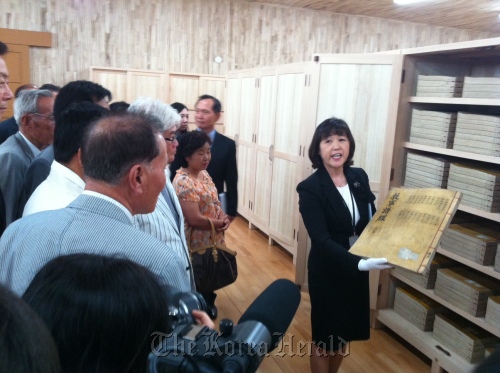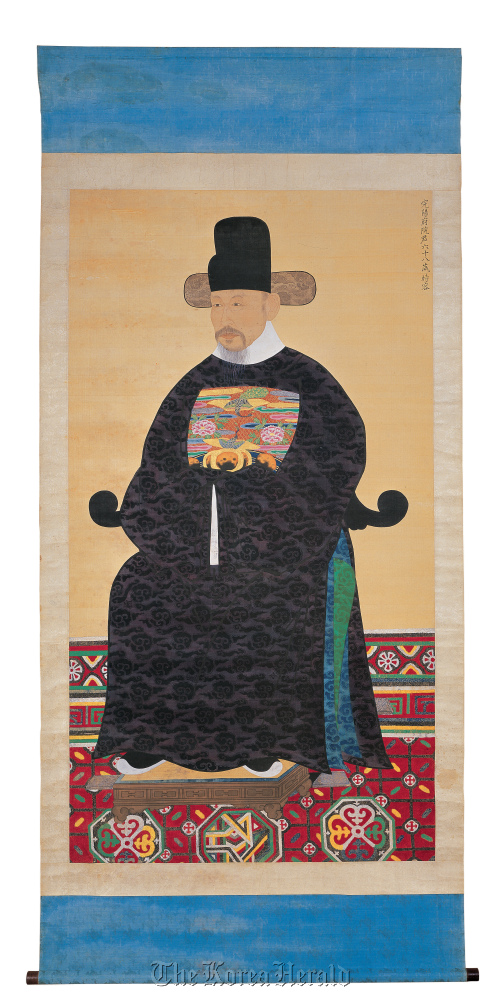
New Jangseogak property secures families’ heritage, documents
When his father passed away in 1992, Park Yeon-dae, who is the living descendant of Park Ui-jang (1555-1615), the Joseon military officer who fought during the Japanese invasion of Korea (1592-1598), had one worry in mind.
“I didn’t know what to do with all the old documents that had been kept by my ancestors and my father,” Park told reporters during a press conference prior to the official opening of Jangseogak Archives at the Academy of Korean Studies in Seongnam, Gyeonggi Province, on Tuesday.
“I found out about the Academy of Korean Studies through someone I knew, and entrusted all the family documents to the institution.”
Park is one of the 43 family members that have either entrusted or donated their old family relics to the institution. Mostly documents and paintings, the relics have been an important source of research for scholars at the Academy of Korean Studies. Now, the family relics have found a new home.
The Academy of Korean Studies on Tuesday officially opened their new building for Jangseogak Archives, which contains some 90,000 historical documents that once belonged to Joseon’s royal archive of the same title, as well as 40,000 entrusted relics from Korea’s prestigious families across the nation.
First founded in 1911 in Changgyeong Palace, Jangseogak served as an alternative place for the royal library that King Gojong (1852-1919) initially wanted to build. The king’s initial vision for the royal library was never realized as the Japanese interfered with his plan.

The books from the royal archive were moved from Changgyeong Palace to the Academy of Korean Studies in 1981, and have been stored there ever since.
Yet as more family relics have been both entrusted and donated ― on top of the original Jangseogak documents ― the institution decided in 2008 to build a new property to both store and research all of the materials in a more spacious and secure environment.
On Tuesday, eight family representatives that have entrusted their ancestors’ relics attended the official opening ceremony of Jangseogak Archives. Most of the representatives were from Korea’s “jongga,” the prestigious households descended from distinguished ancestors through the eldest son of each generation.
One of them was Son Sung-hoon, who currently lives in Yangdong Village in Gyeongju, North Gyeongsang Province, a UNESCO World Heritage Site that best preserves the lifestyle and architecture of the Joseon era. Son is the eldest grandson of the head family of the Sons, who have been living in Yangdong Village since the 15th century.
Son had many old family documents stolen in 2006, which made him decide to entrust all of the relics to the Academy of Korean studies. “I wanted security on top of everything else,” he told The Korea Herald. “It feels good to know that they are now in good hands and safe.”
Park Yeon-dae, another representative, said he learned so much about his family through entrusting the documents. “Though our family has been keeping them since it was the family tradition, I could not understand the materials as they were all written in Chinese characters,” he said. “But after entrusting them, the Academy of Korean Studies has published numerous books in Korean which recorded their findings through the research on the books I entrusted. I thank them deeply for that.”
The Academy of Korean Studies is holding a special exhibition celebrating the opening of Jangseogak Archives, “Kings and Seonbi of Joseon Dynasty,” from July 5 to Aug. 31. The exhibition features both relics from the old Jangseogak as well as entrusted relics from the families. The institute received 10 billion won from the Ministry of Education, Science and Technology for a five-year research project based on the materials of Jangseogak.
By Claire Lee (dyc@heraldcorp.com)



![[Exclusive] Korean military set to ban iPhones over 'security' concerns](http://res.heraldm.com/phpwas/restmb_idxmake.php?idx=644&simg=/content/image/2024/04/23/20240423050599_0.jpg&u=20240423183955)




![[Pressure points] Leggings in public: Fashion statement or social faux pas?](http://res.heraldm.com/phpwas/restmb_idxmake.php?idx=644&simg=/content/image/2024/04/23/20240423050669_0.jpg&u=)










